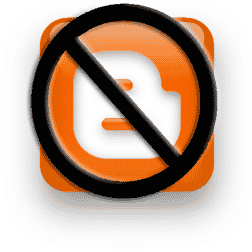I’ve talked with lots of clients about the benefits of having a self-hosted website.
To sum it up frankly:
- Credibility
- SERPs
- Functionality
- Ownership of Content
- Credibility
Yep, one of the biggest factors, in my opinion, about having a free hosted website like yourdomainname.blogspot.com is that you’re basically advertising for another company – in this case blogger. How can an online business really be taken seriously if they aren’t even willing to get their own domain name and promote what they are doing?
 To help the “unbelievers” understand a bit more, here’s some hosting education:
To help the “unbelievers” understand a bit more, here’s some hosting education:
What’s a Self Hosted Website?
“Self Hosted” means you pay a minimal fee (around $7.00 per month) for hosting and a domain name. That’s right, you get BOTH for that small fee.
The scope of hosting services varies widely. There are a few costs to a “self-hosted website”, but they are minimal for the benefits you get.
Here are a few details on specific self-hosted options according to Wikipedia: (I generally recommend the first option if you are just getting started)
- Shared web hosting service: one’s website is placed on the same server as many other sites, ranging from a few to hundreds or thousands. Typically, all domains may share a common pool of server resources, such as RAM and the CPU. The features available with this type of service can be quite extensive. A shared website may be hosted with a reseller.
- Reseller web hosting: allows clients to become web hosts themselves. Resellers could function, for individual domains, under any combination of these listed types of hosting, depending on who they are affiliated with as a reseller. Resellers’ accounts may vary tremendously in size: they may have their own virtual dedicated server to a collocated server. Many resellers provide a nearly identical service to their provider’s shared hosting plan and provide the technical support themselves. (BTW – I was compensated for the link in this paragraph.)
Hopefully you have a better understanding of what the options are out there for running a legitimate website.
Now the Pros and Cons:
Benefits of a Free Hosted Website
- “Free”
- Is it really free if you lose all your content and have to start again?
- Is it really free if you can’t modify the look and functionality of the site very easily?
- Is it really free if you can’t use affiliate links or ad space without permission or without paying a price?
- Is it really free if the content you write really isn’t owned by YOU at the end of the day?
Downsides to a Free Hosted Website
- Free blogs are not very search engine friendly.
- Can’t customize Title Tags on all pages
- Can’t add landing pages
- Can’t modify friendly URLs
- Sub-domains, like yourname.blogspot.com,rarely (if ever) show up high in search engine results
- Often times, the home page is the main indexed page in search engine results
- Free blogs use a sub-domain.
- This hurts your credibility
- All the content you’re providing is actually “owned” by the main domain (blogger.com or wordpress.com), meaning they could turn it off at any time for any reason (see Janet’s case study above)
- Free blogs give you little to no online credibility.
- How many big, professional sites can you list that use blogger or wordpress.com? I can count them on one hand.
- Free blogs limit what you can and can’t do.
- In blogger, you have to be approved to use affiliate links within the Google Affiliate Network
- In wordpress.com, affiliate links aren’t accepted. Here’s what WordPress.com says:
- We have a feature called Ad Control that lets WordPress.com bloggers with a lot of traffic (generally 25,000 pageviews/month or more) and appropriate content turn on AdSense and Skimlinks for their blog and split the resulting revenues 50/50 with us. If you’d like to apply to try Ad Control, please use the form below to send us a message.
- Adsense, Yahoo, Chitika, TextLinkAds and other ads are not allowed on free WordPress.com blogs. If you would like to run ads on your blog, one of these options may work for you:
- Free blogs can be turned off at any time for any reason.
- There’s really no way to back up all your information unless you understand computer hacking and exporting…
Benefits of a Self-Hosted Websites
- Inexpensive: about $7.95 per month (all paid up front)
- Free Domain Name for life
- Unlimited add on domains
- Unlimited email accounts
- $50 worth of Google Adwords Credit
- Unlimited 24 hour access support via phone and chat
Does this information help to clear up your doubts?